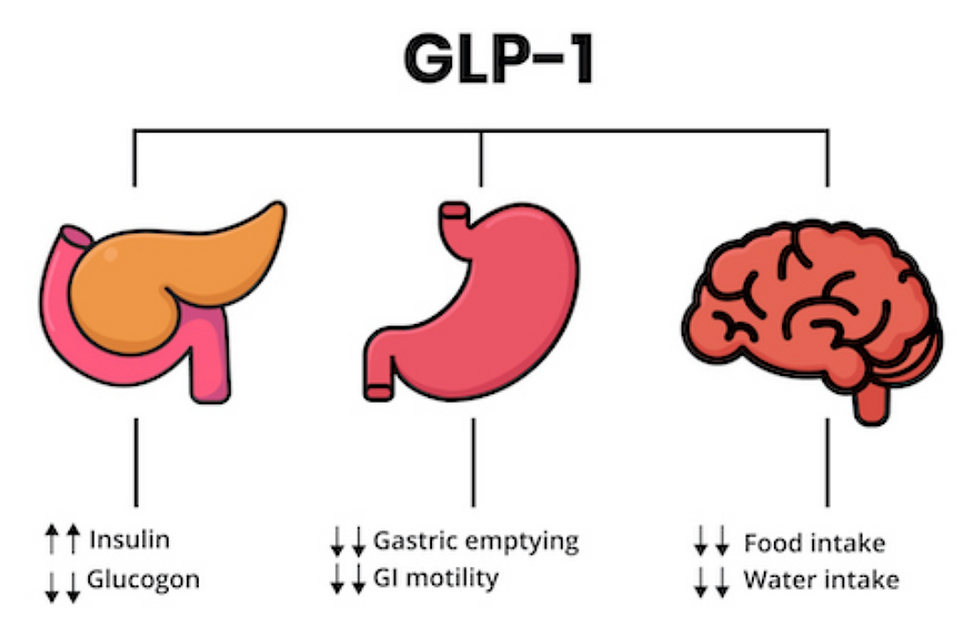If you’ve been around social media in 2023, you might’ve overheard the buzz in the biotechnology community regarding the novel weight loss drugs. Specifically, Ozempic and Wegovy made a splash when they were each announced. These drugs were developed by Danish company Novo Nordisk, which has since emerged as Europe’s largest company by market capitalization. Soon, rivals, including Eli Lilly, raced to launch competitor drugs such as Mounjaro and Zepbound.
So what are these new drugs, and do they live up to the hype surrounding their mystical ability to help people lose weight?
What are Weight Loss Drugs?
Fundamentally, these miracle drugs mimic our body hormones to achieve their aims. But what is the point of weight loss drugs? Aside from the apparent aesthetic effects, obesity has far more detrimental consequences beyond appearances; it has complex health conditions, such as increased risks of type 2 diabetes and cardiovascular diseases.
Ozempic, Wegovy, Mounjaro, and Zepbound seek to address this global health crisis. Technically, there are some differences: Novo Nordisk’s Ozempic and Wegovy use semaglutide as the active ingredient, but Eli Lilly's Mounjaro and Rebound use tirzepatide.
Technicalities aside, these drugs are essentially glucagon-like peptide-1 (GLP-1) agonists. Translated, these drugs copy the effects of the GLP-1 hormone produced in our bodies because GLP-1 plays a significant role in regulating our appetites and blood sugar levels.
How can a Drug Suppress Our Appetite?
Firstly, these GLP-1 agonists interact with receptors in our brains, causing us to feel full, reducing our appetite
Secondly, the drugs slow down the emptying of the stomach, further reinforcing the sense of being full
With a reduced food intake due to a tempered appetite, patients thus would have fewer calorie intake, promoting weight loss.
Regulating Blood Sugar?
GLP-1 agonists also help to regulate blood sugar. Whenever we consume food rich in sugars (e.g., rice, as with most other food), glucose found in such food is absorbed by our body, causing our blood glucose level (or blood sugar level) to increase.
Weight loss drugs stimulate our pancreas to produce more insulin whenever this happens, helping to lower blood sugar levels. Moreover, they inhibit and stop glucagon production by our pancreas, a hormone that, conversely, increases blood sugar levels.
This helps the body reduce blood sugar levels and manage type 2 diabetes (the original purpose of the drugs Ozempic and Mounjaro) while also promoting weight loss!
How Effective Are These Drugs?
In a recent SURMOUNT-1 study, participants taking the highest dose of Zepbound lost an average of 23.6 kg (52.0 lbs) over 72 weeks, while those on Wegovy lost an average of 15% of their body weight. These results are significantly better than those achieved with traditional weight loss medications.
However, despite the promise of these clinical trials, it’s also worth noting that the exact effectiveness can vary depending on each person’s unique physiology: some may respond very effectively, while others may be non-responders.
Moreover, there are some slight cases of side effects such as nausea and diarrhea, with more severe cases including the likes of pancreatitis. Still, such cases remain the vast minority of cases.
Another significant factor to bear is the astronomical costs of such treatments since these drugs can set one back USD 1k to 1.5k without insurance!
Still, the technical feat of developing these drugs remains a significant improvement in our treatment of obesity. It might pave the way for more effective, safe, and affordable drugs in the future.
Reference List
CNN. (2023). Zepbound: FDA approves Eli Lilly's diabetes drug Mounjaro for weight loss. https://www.cnn.com/2023/11/08/health/zepbound-mounjaro-fda-approval-obesity/index.html
Drugs.com. (2023). Zepbound: Uses, Dosage, Side Effects, Warnings. https://www.drugs.com/zepbound.html
Jastreboff, A. M., Aronne, L. J., Ahmad, N. N., Wharton, S., Connery, L., Alves, B., ... & Wadden, T. A. (2022). Tirzepatide once weekly for the treatment of obesity. New England Journal of Medicine, 387(3), 205-216. https://doi.org/10.1056/NEJMoa2206038
Krueger, L. (2023, December 15). 5 Ways Ozempic and Other New Weight-Loss Drugs Have Changed Health. Scientific American. https://www.scientificamerican.com/article/5-ways-ozempic-and-other-new-weight-loss-drugs-have-changed-health/
Medical News Today. (2023). New GLP-1 weight loss drug Zepbound approved by FDA. https://www.medicalnewstoday.com/articles/zepbound-explained-glp-1-weight-loss-drug-fda-approval
Pausé, C. (2024). Anti-fatness in the Ozempic era: state of the landscape and future directions. Fat Studies, 1-18. https://doi.org/10.1080/21604851.2024.2307674
Siegel, S. (2023, May 12). How Ozempic, other weight-loss drugs are "changing medicine". CBS News. https://www.cbsnews.com/news/ozempic-glp-1-class-drugs-used-for-weight-loss/
Saskatchewan Health Authority. (n.d.). APA 7th: Drug Resources. https://saskhealthauthority.libguides.com/citation/apa/drug
Simpson, K. (2024). Celebrities Who’ve Spoken About Ozempic for Weight Loss. [online] Us Weekly. Available at: https://www.usmagazine.com/celebrity-body/pictures/celebrities-whove-spoken-about-ozempic-for-weight-loss/ [Accessed 10 Jun. 2024].
.png)




Comments